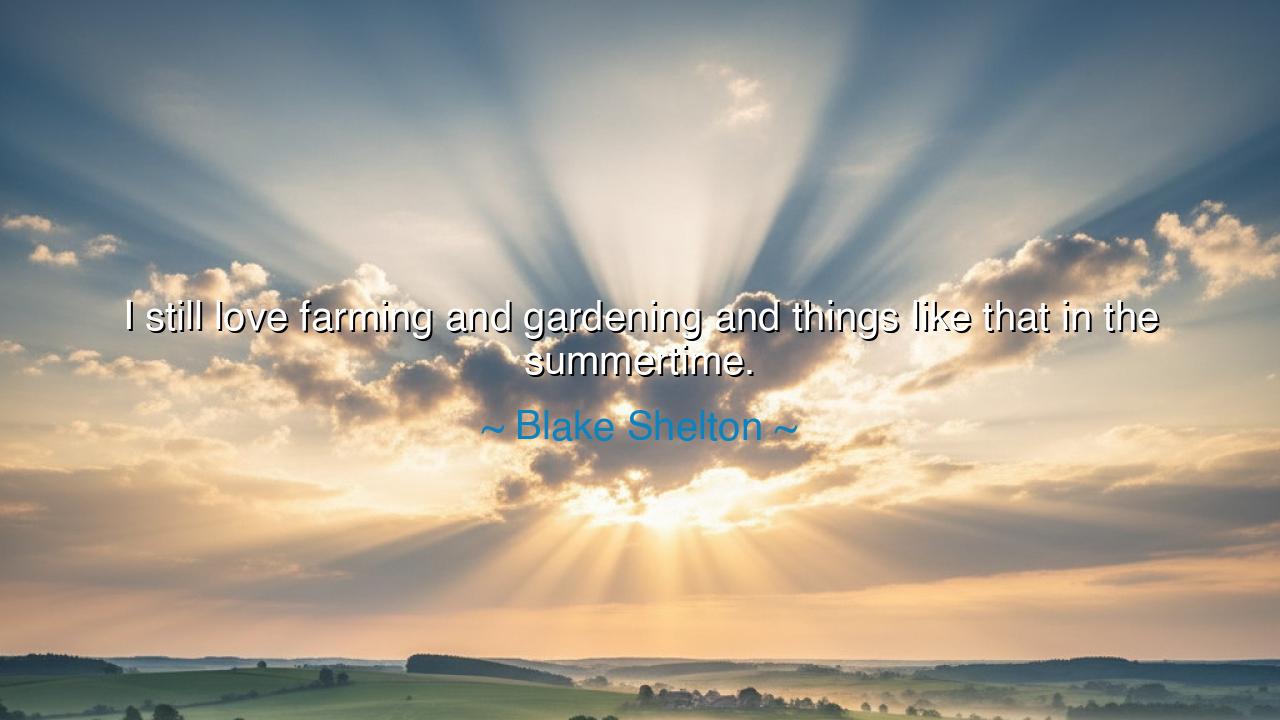
I still love farming and gardening and things like that in the






Hear, O children of wisdom, the words of Blake Shelton, whose deep love for the land and its rhythms speaks to the timeless connection between man and nature: "I still love farming and gardening and things like that in the summertime." In these simple yet profound words, Shelton reveals a deep truth about the human spirit—that even amidst the hustle of modern life, there remains a profound yearning for the peace and fulfillment found in gardening and farming. The seasons, especially summer, offer us the chance to reconnect with the earth, to feel the satisfaction of nurturing life, and to embrace the simplicity and joy of working with our hands.
In the ancient teachings of the Greeks, there was a deep reverence for the earth and the work of the hands. Aristotle believed that agriculture was one of the most noble professions, for it connected humans to the rhythms of nature and required both patience and dedication. In his philosophy, Aristotle spoke of the ideal life as one balanced between reason and practical work, understanding that both the intellectual and the manual pursuits contribute to a full and meaningful existence. Shelton’s love for farming and gardening reflects this ancient wisdom—these activities, seemingly simple, are in fact deeply tied to the human soul’s desire for growth, nourishment, and harmony with the world.
Consider, O children, the story of the great philosopher and gardener Thomas Jefferson, who, despite his intellectual pursuits and political achievements, found joy and fulfillment in tending his garden. Jefferson’s Monticello, with its extensive gardens and orchards, was not merely a place of leisure but a testament to his love of nature and self-sufficiency. In his time, gardening was viewed not only as a means of sustenance but also as a form of creative expression. Like Shelton, Jefferson knew that the act of gardening connects the mind and body, grounding us in the present and offering us a chance to create something of lasting value. Shelton’s enjoyment of farming and gardening in the summer echoes Jefferson’s belief that the natural world is not separate from the life of the mind, but is woven into the fabric of human existence.
In ancient China, the philosophy of feng shui teaches that the earth and its natural rhythms must be honored in every aspect of life. The practice of gardening was seen as a way to maintain balance and harmony within the home and the soul. Confucius also taught the importance of cultivating the land as a means of cultivating the self. In these traditions, to tend the earth was a form of spiritual practice, and gardening was a means of connecting with nature’s cycles, learning the virtues of patience, perseverance, and respect for the world around us. Blake Shelton’s love for farming and gardening in the summer taps into this ancient understanding—that gardening is not just about growing food, but about growing the spirit, and about finding peace in the simple work of the earth.
Consider also the example of Wendell Berry, a contemporary of our time, who, despite his literary fame, has dedicated much of his life to farming and sustainable agriculture. Berry writes about the connection between the land and the human soul, arguing that working the land is essential to understanding the deeper mysteries of life. His life is a testament to the belief that the act of farming is not just about producing food, but about reconnecting with the earth, learning from it, and fostering a deeper relationship with nature. Like Berry, Shelton’s passion for farming and gardening reflects an understanding that these activities nourish both the body and the soul, and that the natural world has much to teach us about patience, growth, and nourishment.
The lesson here, O children, is that we must not overlook the simple joys found in gardening and farming. These practices, while often dismissed as mere hobbies or pastimes, are deeply tied to the human condition. They remind us of the importance of being connected to the earth, of tending to what sustains us, and of nurturing not just the soil but also our inner well-being. Shelton’s love for these activities calls us to return to the basics—to engage with nature, to grow, and to create something lasting in the process.
So, O children, embrace the joys of farming and gardening, especially when the seasons are ripe with abundance. Know that these acts are not just time fillers or leisure pursuits, but spiritual practices that help us reconnect with our roots, both literally and metaphorically. Whether you have a small garden or tend to larger fields, let the act of working the land be a reminder that true fulfillment comes from engagement with nature and the simple, humble work that nourishes both body and soul. In the quiet act of gardening, we find peace, purpose, and a deeper connection to the cycles of life.






AAdministratorAdministrator
Welcome, honored guests. Please leave a comment, we will respond soon